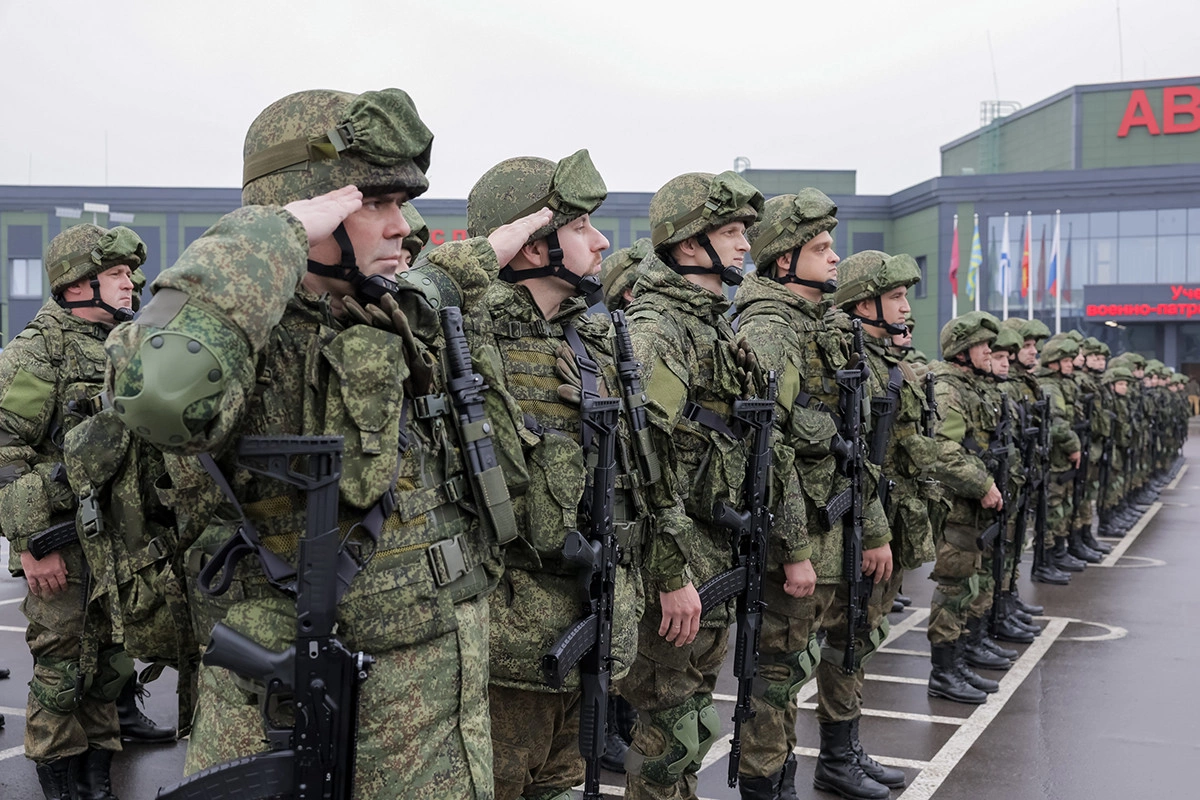
Nationalist calls for migrants in Russia to "pay their dues" are starting to be heard against a mounting backdrop of xenophobic sentiment.
Image: mil.ru
(Eurasianet) Laborers and students from Tajikistan living in Russia are well used to suffering abuse at the hands of law enforcement officers.
The stakes of a reported campaign of detentions and beatings now underway feel higher than usual, however.
Politicians and officials in Russia have lately been making ever-more vocal calls for Tajiks with dual citizenship – a cohort that numbers in the hundreds of thousands – to enlist in the army. Doing so could entail being sent to fight in Ukraine in short order.
The prospect of continued harassment from the police, as well as mounting xenophobia whipped up by chauvinist Russian politicians, may force the hand of many Tajik migrants.
Panic around this whole issue began to spread around late April, when authorities across Russia began delivering digital summons to males eligible to serve in the armed forces. This was the result of a shake-up of the call-up system ushered into law by the State Duma. One notable provision of this change was that even Russian nationals who had not done their military service could be enlisted.
Around that time, numerous social media posts began to appear from Tajiks recipients of call-up messages to say that they had been warned they were no longer permitted to leave the country.
This potential pool of recruits is huge.
According to the Russian Interior Ministry, around 174,000 Tajiks received Russian citizenship in 2022. In 2021, the number was around 104,000. Under an agreement signed with Russia in 1997, Tajik nationals are allowed to hold dual citizenship.
The appeal of this privilege is strong. Holding Russian citizenship spares Tajik nationals of having to go through the time-consuming and costly process of obtaining work permits. It also provides them with greater access to banking services and, eventually, entitles them to pension payments.
Mikhail Matveyev, a State Duma member with Communist Party, is one of a growing choir of voices in Russia arguing for more serious obligations to be attached to that status.
“What’s going on? Why are they not being mobilized? Where are the Tajik battalions?” Matveyev wrote on his Telegram account in early May. “So it turns out that they have rights: child and family support allowances, benefits, pensions paid by Russian citizens. But they have no obligations, like military service.”
A similar theme was heard from an even more influential and powerful figure some days later. Speaking at a conference in St. Petersburg, Alexander Bastrykin, the head of the Investigative Committee, claimed that the rate of criminal offenses committed by migrants was “increasing sharply.”
“This is what people are saying: ‘While Russians are at the front, migrants are attacking our rear,’” he said. “People are suggesting that if they are citizens of Russia, then let them go to the front. If you don’t go to the front, if you don’t perform your civic duty, then go back to your country.”
Against this backdrop of rhetoric, Valentina Chupyk, a formerly Russia-based migrant rights activist now living in the United States, has urged foreign nationals with Russian citizenship to immediately leave the country on their other passports. Speaking last month to RFE/RL’s Tajik service, Radioi Ozodi, Chupyk said nobody should consider themselves immune.
“You cannot count on age, on having many children, on being ill, on not having a residence permit, or not having done military service. People who have received a summons should know that Russia for them is no longer a place where they can work legally, get a pension or have a decent life,” she said.
This is not the first attempt made in Russia to press-gang Central Asian citizens into filling the ranks of armed forces severely depleted by a disastrous military campaign in Ukraine.
Late last year, reports proliferated about army recruiters using trickery, bribery, and often intimidation to enlist foreign laborers. The campaign was most heavily focused on the Sakharovo migration center in Moscow, where foreign nationals are usually found in large numbers, waiting in long lines to obtain or renew work permits.
Migrant rights activists said at the time that foreign nationals were being promised a streamlined naturalization procedure and generous salaries in return for fighting in Ukraine.
The Tajik government has so far refrained from commenting on calls for Tajiks to serve in the Russian army. At the start of Russia’s invasion, though, the Foreign Ministry warned that citizens should refrain from getting involved in combat in third countries. And under Tajik law, people found guilty of enlisting in mercenary organizations – such as Wagner, the private army that has done much of the fighting in eastern Ukraine – can face prison sentences of up to 25 years.
But while Dushanbe bullies its own citizens at will, it typically acts far more cautiously in pushing back against Russia. The economic data explain why. In 2021, individuals living and working in Russia sent around $1.8 billion in remittances to Tajikistan. This money is what keeps the anemic Tajik economy from going under.
As far as the current spate of detentions of and assaults on Tajik nationals goes, however, the government in Dushanbe has taken some action.
On May 24, the Foreign Ministry said it had summoned the Russian ambassador, Semyon Grigoriyev, to convey its concern over the situation. The ministry dwelled in particular on an incident on May 19, when more than 100 Tajik students at a university in the far eastern Russian city of Komsomolsk-on-Amur were interrogated and assaulted by police officers.
“Such incidents are not in the spirit of the Tajik-Russian strategic partnership and alliance, and they could harm the efforts of [both nations] to further develop cooperation in education,” the ministry said.
Share on social media